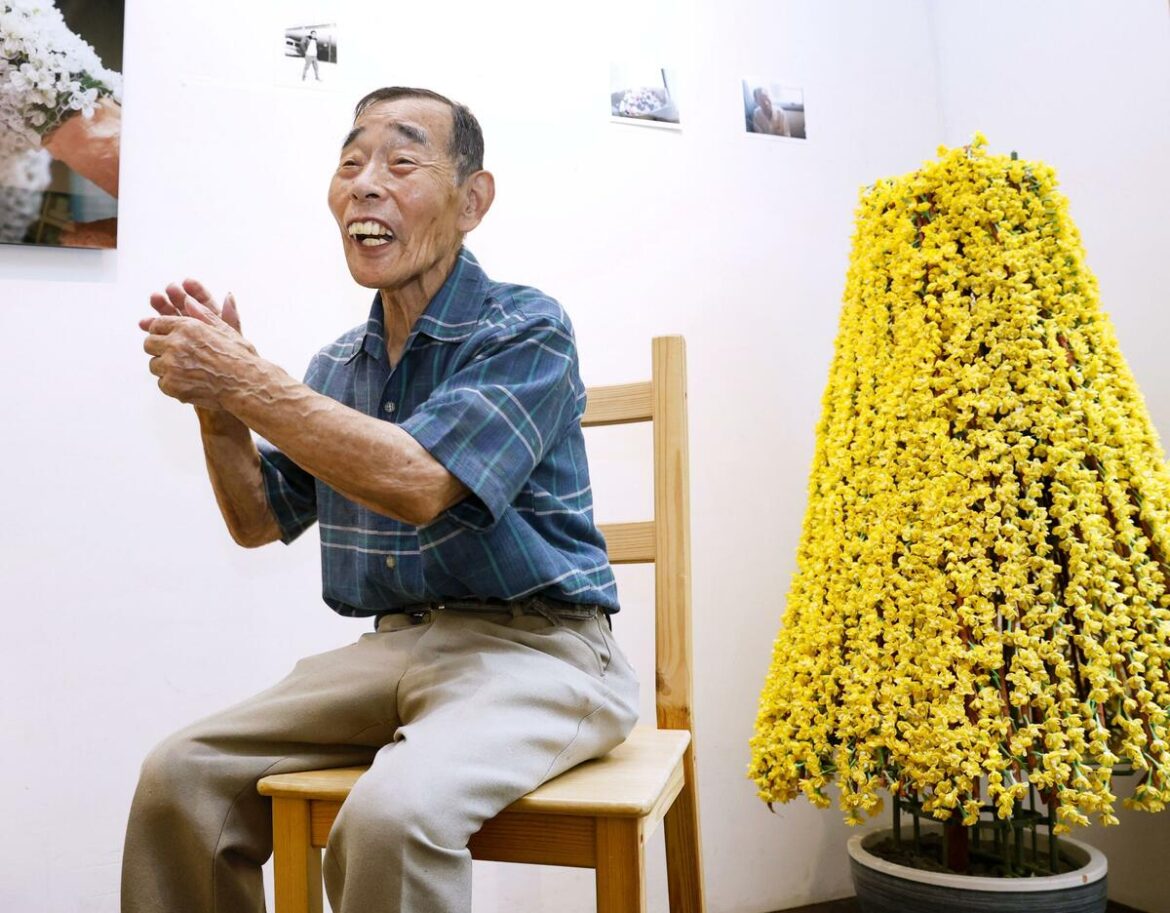TOKYO – Saburo Kita’s arrangements of paper flowers are a bittersweet reminder of the life he had hoped for before he was forcibly sterilized under Japan’s now-defunct eugenics law.
Kita was labeled a delinquent as a child and sterilized at age 14. He was told the procedure was simply “to remove the bad part.” After the surgery, he discovered he would never be able to have children.
He then lived at a child welfare facility where he learned his paper craft. He chose not to reveal the surgery to his wife until just before her death, calling it a “painful secret.”
Now 82, Kita offers the paper flowers he creates as gifts to the many people who have supported him over the years.
Under Japan’s eugenics law, in effect from 1948 to 1996, authorities sterilized people with intellectual disabilities, mental illnesses or hereditary disorders without their consent to prevent the birth of “inferior” offspring.
According to government estimates, about 25,000 people were sterilized, 16,500 of them without consent. The law has often been described as the worst human rights violation in Japan’s postwar history.
Kita (a pseudonym) is now at the forefront of a movement to raise awareness about how victims of eugenics were harmed by the Japanese government before they secured compensation and an apology from the state last year.
At an event held at the United Nations headquarters in New York in June, Kita and other eugenics victims shared their experiences in the hopes that the tragedy is never repeated.
Organizers including the Japan Disability Forum plan to continue the initiative next year, convinced that Japan’s experience will serve as a cautionary tale on the world stage.
“I sincerely hope that Japan, and indeed the whole world, will become a society where people can decide (reproductive rights) for themselves,” Kita said on the sidelines of the U.N. conference on the Convention on the Rights of Persons with Disabilities, where he was greeted with warm applause.
According to Osamu Nagase, 66, a JDF policy committee member involved in planning and organizing the U.N. event, forced sterilization surgeries are performed in many countries due to systems such as adult guardianship.
The guardianship system has been criticized for reportedly preventing disabled people who become pregnant and others from exercising their reproductive rights.
Nagase said he was particularly struck by the situation involving a woman with an intellectual disability he met in Thailand around two decades ago. Learning that she had been forced to undergo sterilization, he asked the person caring for her why, only to be told it was “common sense,” a remark that made him furious. The experience inspired his campaign.
In Japan, the issue of forced sterilization is shrouded in taboo not only due to prejudice and discrimination against persons with disabilities, but also because it involves matters of sexuality and reproduction.
Calling on the state to “not bury the issue in darkness anymore,” victims of forced sterilization in Japan have filed successive lawsuits seeking state compensation since 2018.
Some plaintiffs, including Kita, fought publicly, and won their case at the Supreme Court in July 2024. The government apologized and promised compensation and measures to prevent a recurrence.
For Kita, the U.N. visit was his first overseas trip, funded by the compensation he won in his lawsuit. In his free time, he watched Major League Baseball games and witnessed a home run by Shohei Ohtani of the Los Angeles Dodgers.
Kita’s lawyer, Naoto Sekiya, 48, who continues to support him and accompanied him to the United states, believes that seeing a victim who endured such hardship embark on a new life can encourage “those who cannot speak up.”
In September, Kita held an exhibition at a gallery in Tokyo, where he put his papercraft plum blossoms and hydrangeas on display. He says the beauty of real cherry blossoms he saw after undergoing sterilization were permanently etched in his mind.
Kita has continued creating artificial flowers by layering and blending colorful paper in shades of pink, white, blue and yellow. “It was my dream,” Kita said, referring to the nearly monthlong exhibition.
He even brought a large artificial plum blossom bouquet to the United States, where he presented it to an international disability organization.
Compensation for victims of the defunct law has begun, but awareness remains limited. Kita, who has poured his heart and soul into the creations that now give his life purpose, said, “I hope as many people as possible are saved (from eugenics).”


AloJapan.com